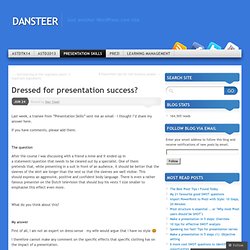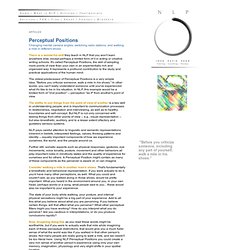

Businessinsider. A TED speaker coach shares 11 tips for right before you go on stage. Gina Barnett advises a speaker before the annual TED Conference.

Below, her best last-minute public speaking tips. Photo: Ryan Lash/TED The weekend before a TED conference, each speaker rehearses their talk in the TED theater. It’s a chance for the speakers to get to know the space, for our curators to give last-minute suggestions on talk content, and for our speaker coaches to give advice to help each speaker feel their absolute best the day of their talk. During this time, we overheard speaker coaches Gina Barnett, Michael Weitz and Abigail Tenenbaum give some helpful tips that we’d never heard before.
Voice. Body Language. Connect to your audience, like Yannick Noah. Several years ago, my wife’s company invited its employees and family to “Roi Baudouin Stadium” in Brussels to see Johnny Hallyday in concert.

Now, I’m not going to mention his name again, or (dare I say it in Belgium) mention how terrible that entire experience was for me. But I would like to say something about his support act, Yannick Noah. Noah was a tennis player first, but now makes music. Opening for Johnny, he was wild. Hs music was full of energy and so was he. Now, I don’t think this was a pre-thought strategic move from him. i think he did this out of pure excitement. Here are a few simple ideas to try out the next time you speak in public: Don’t stand in the same place all the time. Almost every presentation you never see is either exactly the same as the last one, or a minor upgrade in terms of performance.
I’m currently researching for more content for my e-book “Build and Deliver Awesome Presentations”. Want more? Like this: Like Loading... Presentation Intro, Steve Ballmer style :-/ Dressed for presentation success? Last week, a trainee from “Presentation Skills” sent me an email – I thought I’d share my answer here.

If you have comments, please add them. The question After the course I was discussing with a friend a mine and it ended up in a statement/question that needs to be cleared out by a specialist. One of them pretends that, while presenting in a suit in front of an audience, it should be better that the sleeves of the skirt are longer than the vest so that the sleeves are well visible. This should express an aggressive, positive and confident body language. What do you think about this? My answer First of all, I am not an expert on dress-sense – my wife would argue that I have no style :-) I therefore cannot make any comment on the specific effects that specific clothing has on the impact of a presentation. What I can say is: 93% of what is understood by other people is more than words – this includes body-language and all sorts of other things (like culture, convictions etc..). Hope this helps! 5 conf-call tips. I just spent an hour and a half on conf-call with 3 people, sharing training information from a session they missed last year.

This post gives 5 simple tips on how to do this well. During a 4-day Project Mgt Round-Table initiative, each afternoon was dedicated to learning people and behavioural skills. The afternoon they missed was all about “Understanding other people” and “Commercial Communication”. Since they missed the training, the call today was to get them up-to-speed. In that sense, a knowledge-building session (rather than skill building), but I didn’t want it to be “just me talking”. As a personal debrief, here are some tips for trainers who train over the phone (or just general conf-call tips) – list is a non-exhaustive and in order of thought, not priority: Don’t be afraid to “ham-it-up” a little and “act more” Boring people are boring to listen to. Take time to address individuals 2 elements – first address individuals, then take time.
3 Perceptual Positions. "Before you criticize someone, including any part of yourself, walk a mile in his shoes.

" Changing mental camera angles, switching radio stations, and walking a mile in different shoes There is a wonderful skill they teach in NLP that you won't learn anywhere else, except perhaps a limited form of it in acting or creative writing schools.